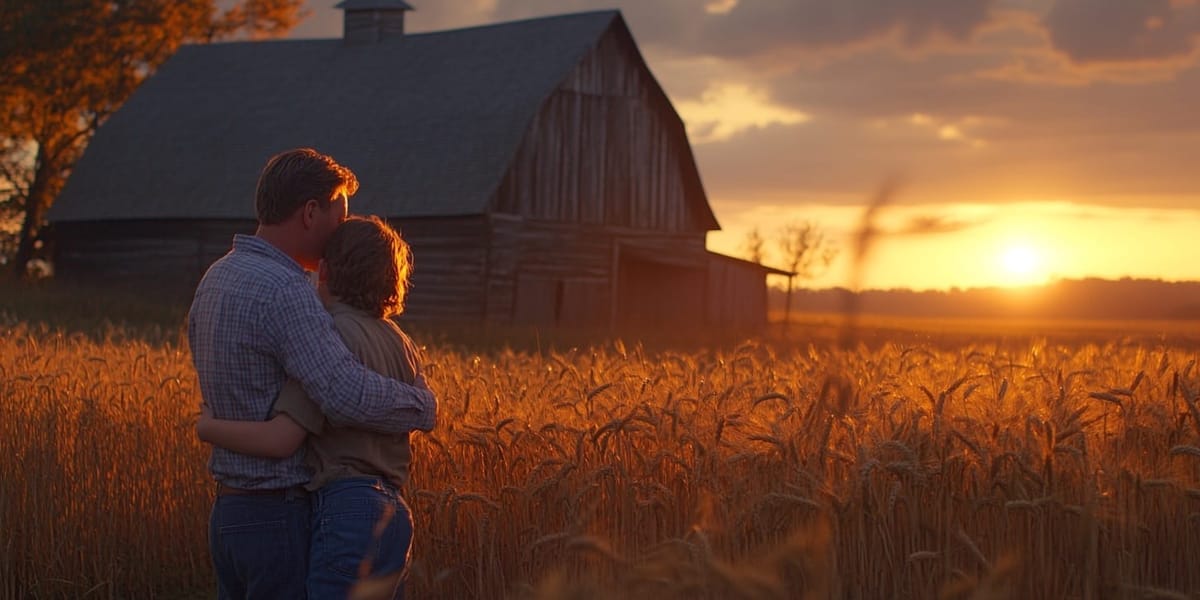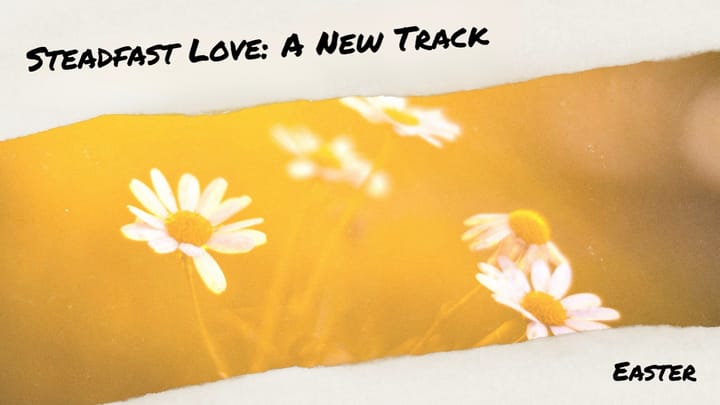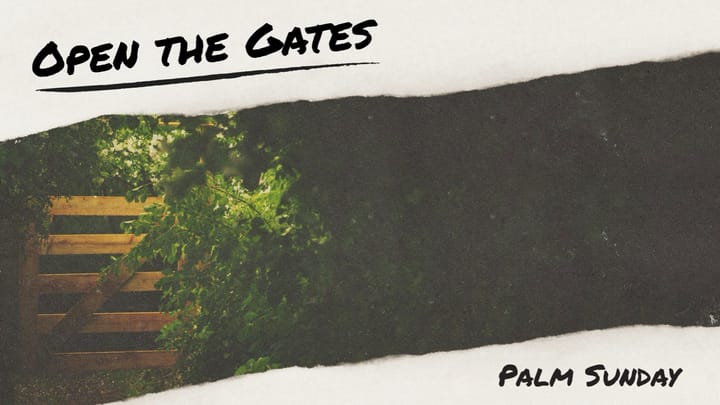Fairhaven Sermon 3-30-2025

Summary
In this week’s service at Fairhaven United Methodist Church, Pastor Dylan Parson reflected on Luke 15:11-32, the parable of the prodigal son and his older brother. Drawing from personal experiences, Pastor Parson noted that most attendees see themselves more as the dutiful older brother rather than the wayward younger one. He emphasized that being well-behaved or respectable does not equate to goodness; it can be a form of spiritual danger. The sermon highlighted how pride and resentment often fester in those who have lived exemplary lives, leading them to resent the forgiveness shown to others. Pastor Parson used the parable to encourage listeners to recognize their own need for grace and mercy, reminding them that God's love is not limited by His actions towards others.
Moreover, he underscored that the older brother’s resentment stems from a misunderstanding of his father’s unwavering love—love which has always been freely available. The pastor concluded with a powerful message: grace does not diminish but enhances one's experience of salvation. He urged listeners to be vigilant against feelings of grudging mercy and to remember that God's infinite love is inclusive for all, including those who have strayed or caused harm.
Transcript
So at this point in my life, at least now, you know, I don't have any prodigal siblings. I never really have. We all have our issues. Everyone does.
Every family does. But I think my parents would agree that, generally speaking, they got pretty lucky. My youngest brother is a college student who coaches girls' high school basketball. My next brother works for an electrical contractor.
He's about to have a baby in a couple months. He's got a ranch house and two golden retrievers. Exceedingly normal life. My sister lives with her boyfriend in New York City.
She works for a nonprofit that fights housing discrimination. She's doing the kind of stuff she always wanted to do. And I, unfortunately, am perhaps in the most respectable line of work in America. And I've gone through a very orderly, very successful academic and early work career before that.
I did not sneak out of the house as a teenager. I did not smoke in the bathroom. I worked to get good grades. I did my extracurriculars.
I got good scholarships. And now I've landed in something resembling a stable career, allegedly. Okay. And as it happens, at one point last year, Stormy can confirm this, someone looked at me revolted and groaned that I am, quote, disgustingly normal, which kind of hurt, honestly.
So I think I'm pretty far from a prodigal son, as classically understood. That's a word, prodigal, that we really only use at this point in English when referring to this biblical story. You never use that anywhere else anymore. But it simply means, outside of this context, a person who is wasteful and extravagant and decadent, irresponsible, kind of that sort of person.
And that's how Jesus here in Luke's gospel sums up this character. The so-called prodigal son wastes his wealth through extravagant living. He blows the inheritance that he asks to cash out long before his father is actually dead, which is pretty offensive to begin with. Hey, dad, give me what you're going to give me when you die.
And accordingly, the reality is this as I read the story. If I'm looking for myself in the parable, I'm very distinctly the older brother. I never really caused any problems. I'm always, you know, dutifully doing what I'm supposed to do.
And this is, of course, the classic older brother or older sister role, even today. And it seems like it was 2,000 years ago in Galilee. You got that responsible oldest brother. Right? Now, I won't spend too much time today talking about what this parable says for those among us who recognize themselves as prodigals, those who have spent their lives at odds or running from God and their loved ones.
I think the parable is pretty clear for those people, right? God's arms are always wide open no matter what. Those who have wandered are welcome to come back to their loving father. And I hear this all the time. You'd be surprised how often I hear this, the number of people who tell me the church will fall down if they ever come in.
And it's very sad because Jesus is teaching us here that the exact opposite is true, that the Father rolls out the red carpet for the one who feels like he has no worthiness to come back. But people say that to me all the time. Amen. but there is no one that God doesn't want in this place.
And there's no one that God wants more, either at the baptismal font, the communion table, or in those seats, than someone who's never been there before or has been away for a long and difficult time. The walls of the church won't fall down. And in fact, the Father prepares a heavenly party for the situation. That is what this parable tells us.
God has a special place for the prodigal sons and daughters, and I hope that's obvious to all of us from the way that Jesus speaks in Scripture, including in this parable. But what I think is perhaps more important to many of us here is to speak to the perspective of the older brother. because the majority of us probably see ourselves more in him. The Pharisees are supposed to as well, by the way, and they're the church folks of their days.
This parable is told for the benefit of the Pharisees, of those who are the older, responsible brother, rather than those who is the miscreant younger brother. He's not the one listening to the story. Most of you, to the best of my knowledge, are responsible, productive members of society. You're not people who spent last night getting drunk, gambling, partying away your inheritance or your social security check.
Most of you, I think it's fair to say, are people who are decent and respectable. And so I would put myself in that category, I like to think. And so this is uncomfortable to acknowledge, but I would suggest that being in that place of decency, of respectability of that older brother is a really dangerous place to be spiritually. It can be kind of corrosive to your heart.
The propensity of the prodigal younger brother to visible egregious sin is obvious. He's squandering his father's estate on prostitutes and gambling and all this stuff. He's very visibly bad, so to speak, right? Those of us who live in that older brother zone are prone to much sneakier forms of sin. Right? The older brother who's clean cut and dutiful and responsible is well behaved.
This is not the same thing as being good. I want to say that again. Being well behaved or hardworking or respectable or however you might best relate here is not the same as being good. goodness or holiness, we might say, is an orientation not only of your behavior, but of your heart and of your spirit, what's going on inside, not just what you're doing outside.
You can go about your life squeaky clean in your behavior and still have a heart of ice cold stone. And that really, I think, comes to the surface in this parable. When the prodigal son comes home and his father welcomes him with joy and generosity, you can sense what's boiling in the heart of that well-behaved older brother. Pride, resentment, insecurity, envy.
he's enraged. First, he refuses to go to the welcome feast, and then he lectures his father about it. He reminds him how naive he's being, how despicably his younger brother has behaved, as if his father doesn't know, right? And now this is just a guess on my part, but I'm pretty confident in this. I promise you, That all of the bitterness and the jealousy and the pridefulness is not just emerging now that the brother is home again.
This isn't new. This sludge has been bubbling in the older son's heart since he was a kid. He watched his brother shatter a window with a baseball and get away with it. He watched him bring home C's and D's every semester, sneak home late after getting drunk with his friends, steal his father's money out of his dresser to buy drugs.
He watched his mother cry as this got worse and worse and worse. And meanwhile, he did his best in school. He helped with the housework. He got a job of his own as soon as he was able.
And to this day, very rarely misses a Sunday of church. Very different. Very different. So make no mistake here in this parable, he has been genuinely harmed by his brother.
His whole family has been harmed. If you've ever had a relative like this in your family, you know what it's like. His soul has been harmed. He's been made more callous.
He's been made intolerant in a way he'd never want. He never wanted to feel this way about his brother. And his feelings here upon his brother coming back and getting this celebration make complete sense. Because in some ways, and he'd never say this out loud, but he'd be happier if his brother had simply stayed dead.
It would keep the equilibrium that developed since he left. His parents wouldn't be threatened by painful entanglement in this mess all over again. And it certainly would keep things more fair. He could keep up the good work and lead a decently secure, quiet life.
They all could. But now that's coming crashing down as his black sheep of a brother returns. And so the young man's father desperately tries to get his older son to understand the situation from his perspective. This brother of yours was dead and is alive.
He was lost and is found. This forgiveness, the celebration is offered freely without regard for what's come before. That was then. This is now.
All this stuff has happened. Yes, but he's back. Yes. We thought you were dead and now here you are alive and well.
And the father runs out of the house to meet his son. His arms are flung open. He's got tears in his eyes. He doesn't wait for an apology or a justification.
He doesn't look for an excuse before deciding how to react. That comes second. The parable shows that the father, that God has no interest in tough love towards the one who comes back. Just regular, old, soft love.
And that is just intolerably frustrating for the older brothers among us. We older brothers want the prodigal son and people like him in our lives and in the world who have harmed other people to face some kind of justice, by which we mean punishment, before they can be brought back into the fold. And it helps maintain this alluring myth to which we cling desperately of having earned our place in the world. And in God's grace of getting what we have come to deserve.
But that's just not the case. Because that wouldn't be grace. This feeling, this conviction that we have that everybody's got to get what they deserve is the result of pride scarring our hearts. Because here's the thing.
Listen to this parable, how it went here. The older brother didn't do anything to earn his position either, if he's honest with himself. What right does he have to be angry at the mercy that was shown to his younger brother? His father tells him this. He says it softly and kindly.
Son, you always were with me, and everything I have is yours. He's been taken care of his whole life. He, just like his younger brother, has received nothing but unconditional love from his father. And even so, he's stewed bitterly about his poorly behaved brother for years, for a lifetime now, as if the love that his father has for his brother somehow devalues the love that he's unceasingly received himself.
The reality is that love has never been a limited resource in that household. But the brother treats it with contempt because he's not receiving it on his own terms. He's not receiving the love that he thinks he deserves because if that other guy's getting it, what's that mean about me? And so he lashes out at his father for loving not only the so-called deserving son, but also the undeserving son, and says, I've served you all these years. I never disobeyed your instruction, yet you've never given me, never given me so much as a young goat so I could celebrate with my friends.
But when this son of yours returned, after gobbling up your estate on prostitutes, you slaughtered the fattened calf for him. Again, this is just kind of crazy. He's lived in his father's household his whole life. He's been cared for, he's been loved.
We see no evidence that's not true. But he can't see that. He can't see past the grace that was shown to his undeserving brother. And here's what strikes me most about the situation.
This part, I really just noticed this for the first time. You know, he says, You've never even given me a young goat to celebrate with my friends. Did he ever ask? Did he ever ask for this goat to have a feast to celebrate with his friends? Did he ask like, hey, dad, I'd love to do this. Is there any reason whatsoever to believe the father would say no if he was asked? Or has this brother just lived in this grudge for untold years, relishing the bitterness? You know what that's like.
You like being mad. Convincing himself. His father loves him less, just stewing over it, despite that just not being true. He lives in this prison that he's made for himself.
Okay. Our Lenten playlist song this morning was Casey Musgrave's Rainbow. And the refrain of that song sounds to me like it could have been written by this father who's speaking softly to his resentful older son as this wayward younger son returns. This was how the chorus went.
The sky has finally opened, the rain and wind stop blowing, but you're stuck out in the same old storm again. You hold tight to your umbrella, but I'm just trying to tell you there's always been a rainbow hanging over your head. this son, this eldest son has always had everything that he's needed. He's always been swimming in the father's love.
He just needs to unclench his fists, lower his shoulders, and look around and see. He needs to put down the umbrella that he's been gripping tight to and look up at the sky. And so I wonder, are you hearing this parable for you? The infinite, the steadfast love that the Father has for you is not limited by the love God has for anyone else. No matter how much you might hate or resent or be disappointed in them, even if you're completely justified in that resentment, even if, maybe especially if, It doesn't matter how much they deserve it.
It doesn't matter how much you deserve it because there's no such thing. That's not how grace works. That's not how the love of God is poured out. The mercy that is shown to others in no way diminishes the mercy that's been rained down on you.
And, you know, rest assured that you have needed and received mercy. Mercy. That does not dim this rainbow of salvation that hangs over your head. So be deeply vigilant if you find yourself begrudging mercy or compassion shown by God or others towards the prodigal, the wayward, the criminal.
Be careful. Think twice. If you even silently, quietly start to believe that you have earned your place in the world or the kingdom of God by anything you have done, because remember, being well-behaved is not the same as being good. Pride, which is the real fault of the older brother here, pride, is a lie that erases grace.
It's a sin. And the older brother in this parable, who again is just dripping in this corrosive sin himself, tries to distance himself from this more visibly sinful prodigal brother, and he hisses at his father in disgust. I don't know if you noticed this, but he hisses. He's so mad about this son of yours, he says, has returned.
This son of yours. But hear the words that his father uses in response to him. We had to celebrate, we had to be glad because this brother of yours was dead and is alive. He was lost and is found.
There is grace enough for all. There is room for all people in the Father's household. And there is more love than we could ever know what to do with. And that prodigal, that wayward, criminal, addict, outcast, excluded son or daughter, well, that's not just that son of yours, God.
That's your brother, your sister. And that rainbow overhead is for both of you. In the name of the Father and the Son and the Holy Spirit. Amen.
Amen.


